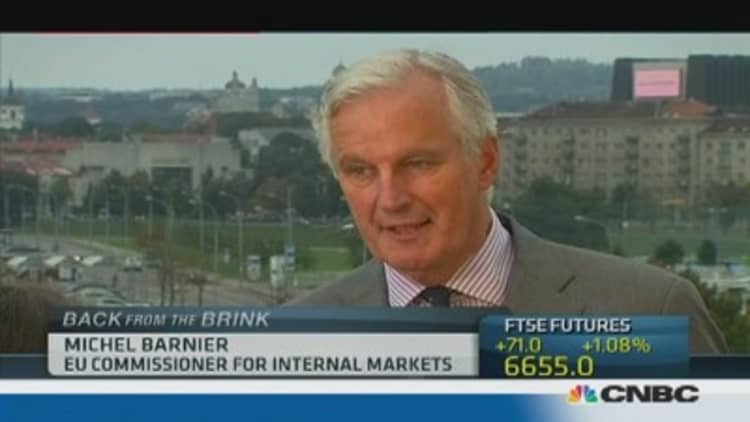
Five years after the collapse of Lehman Brothers, those complaining about tighter regulations do not have long enough memories about the crisis, according to the man responsible for many of the European Union rules introduced following the collapse.
"There are so many people suffering, in the U.S. with the housing crisis after the sub-primes, in Europe on a social level, we do not have the right to have short memories," Michel Barnier, European Commissioner responsible for financial services, told CNBC at the weekend's meeting of euro zone finance ministers.
"People need to get used to the fact that each financial product, each financial actor, take their responsibilities and be correctly supervised. This is the objective of these laws and I don't think that we went too far."
Following the demise of Lehman Brothers, several pieces of high-profile regulation have been introduced, or are in the process of being implemented, to try and prevent the fallout happening again on both sides of the Atlantic. The Dodd-Frank laws in the U.S. aimed to regulate Wall Street, while Barnier's reforms are trying to stop another euro zone debt crisis.
Deregulation of the financial system during the previous decades has been blamed for the debt crisis. Barnier is not the only person warning that regulation must be tightened.
Bob Diamond, the former chief executive of Barclays, who bought up some of Lehman Brothers' assets following the collapse, wrote in the Financial Times on Monday that regulation so far was "insufficient to end the 'too big to fail' problem."
(Read more: Diamond on "too big to fail")
One of the key components of European reform is a Europe-wide banking union, which Barnier said is "revolutionary" and will help limit future risks.
"We have now the tools to deal with potential turbulence. And above all to encourage these banks to do their job: lend money again to the economy, companies and consumers," he said.
(Read more: Euro zone banking union moves closer)
European banks have been given an unprecedented injection of cheap loans by the European Central Bank since the crisis began, which has helped return the euro zone to economic growth, but there are concerns that this has not filtered down to the "real economy" in the way which was hoped.
Follow Catherine on Twitter: @cboylecnbc


